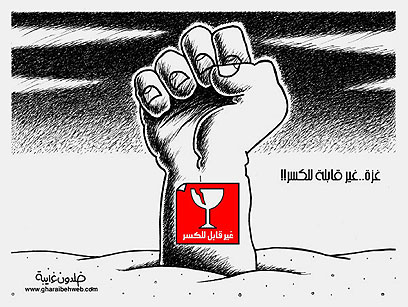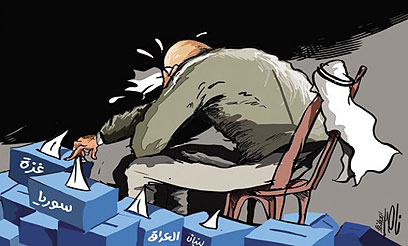While the Arab media attempts to discern who won or lost the Gaza conflict, Al-Arabiya draws parallels between the Israeli and Syrian armies.
By Roi Kais
With a truce declared and Operation Pillar of Defense over, the media in the Arab world ventured to discern who were the winners and the losers in the conflict. Several papers chose to crown Hamas as the victor, while others claimed that Iranand the Palestinian Authority were on the losing end of the hostilities. Some even decided to draw parallels between the Israel Defense Forces and the Syrian army.

Gaza is unbreakable. From Jordan’s Al-Rai newspaper
The London-based Al-Quds Al-Arabi ran an opinion piece expressing disappointment with the terms of the ceasefire agreement that was reached between Israel and the Gaza factions.
“I was seriously disappointed when I didn’t see the elimination of the Gaza blockade on the list of primary terms,” the editor wrote, adding nevertheless that “the resistance didn’t capitulate and did not yield to the oppressive Israeli terms. ”

The Israeli gator in pool of blood. From Al-Quds Al-Arabi
“The operation only bolstered the legitimacy of the groups in Gaza, while the support for the Palestinian Authority and its pursuit of peace has dropped,” he wrote.
A former Jordanian minister said in a column published by the Asharq Alawsat paper that it was Israel that benefited from the conflict.
“Israel profited from the war, especially on the backdrop of the Palestinians’ intention to turn to the UN,” Saleh Al-Kallab wrote, explaining that the rockets that were fired by Hamas on Israel further convinced the West that a Palestinian state would be “a ticking time bomb.”

Spotlight on Gaza, not Syria. From Al-Hayat
Al-Hayat writer Hassan Haidar, meanwhile, claimed that the Jewish state was the loser in the conflict – alongside Iran and the Palestinian Authority. According to Haider, Israel found itself deadlocked midway through the operation, being unable to stop the offensive or expand it.
“Instead of reinstating its deterrence capability as its military leaders had planned, this capability dropped to a minimum once missiles reached Tel Aviv and Jerusalem,” he said.

Crying for Gaza and Syria. From Jordan’s al-Rad
Haidar stated that while Iran was glad that the spotlight was drawn away from Syria, it got no political benefit out of the fighting.
He equated the Islamic Republic to “a woman who has been deceived, because while it provided (Hamas) with missiles, the political rewards were reaped by others (Egypt, Qatar and Turkey).”
He noted that Hamas will take advantages of the headway it had made to further its agenda in the Palestinian arena.

Iran fanning flames of Gaza conflict. From Lebanon’s Al-Mustaqbal
“Rhetorical exaggeration aside… the opportunity to liberate the West Bank appears to be within reach,” he said. “Hamas said that the resistance needs to lead the Palestinian diplomatic efforts and this explains why the Palestinian Authority was left out of the negotiations in Cairo.”
In line with his previous pieces, Asharq Alwasat editor Tariq Alhomayed claimed that Syrian President Bashar Assad‘s regime was the primary beneficiary of the conflict because the fighting in Gaza drew attention away from the war in his country.
Al-Arabiya, which is funded by Saudi Arabia, went as far as to compare Israel’s Operation Pillar of Defense to the bloodshed in Syria.

Israel’s ceasefire ‘egg.’ From UAE’s Al-Baya
“The Syrians faced a painful surprise when the ceasefire between Israel and Hamas was announced: The Israeli army is more compassionate towards its Palestinian enemies than Assad’s army is towards its citizens,” the network said.
Al-Arabiya pointed out that over the course of eight days Israel made over 1,500 airstrikes, killing 160 Palestinians. During the same period, the Assad regime killed 817 Syrians.
View original Ynet publication at: http://www.ynetnews.com/articles/0,7340,L-4310810,00.html






 Israeli New Shekel Exchange Rate
Israeli New Shekel Exchange Rate